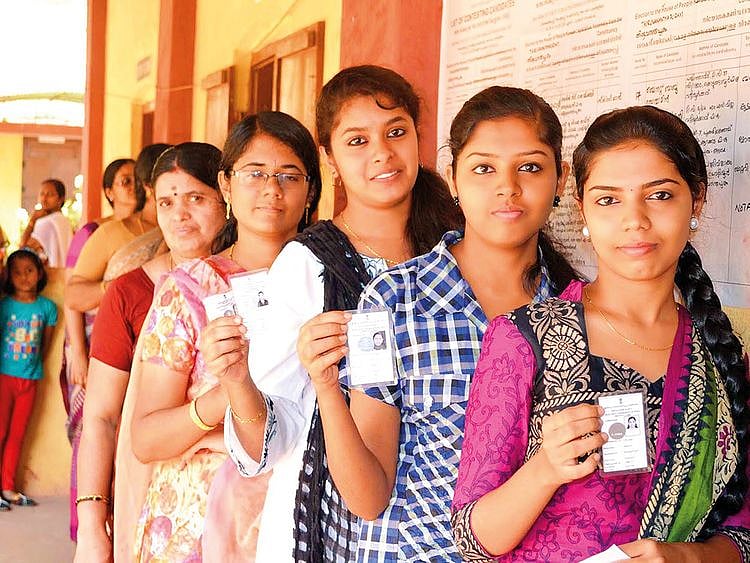It is not just India’s prime minister Narendra Modi who has complained about “freebies”. It is not just the Supreme Court and the Election Commission of India who are worried about “freebies”.
These days, even the average voter of the Bhartiya Janata Party is concerned about “freebie culture”. You can go to any chai shop in India and hear people say: The biggest issue in India today is not tensions with China, or unemployment or inflation or violence against women or uniform civil code.
India is in the throes of freebie phobia. “These days people just want everything for free,” says a visitor in a shop in south Delhi. “In Gujarat we don’t like anything for free,” people told me in the BJP bastion recently.
The freebie-phobia is so monumental that you don’t have to ask people about it. They’ll bring it up on their own. Freebie is the new terrorism. Freebie is the new Congress. Freebie is the enemy. The nation shall stand united against Freebie. We shall defeat Freebie. We shall overcome.
If we defeat Freebie, rivers of milk and honey shall flow, the Ganga will no longer be polluted, fibre optic cables will finally reach every village, bullet trains will drop you at your doorstep, air pollution will magically disappear, everyone will have a job, inflation will be so low people won’t know what to do with their disposable income.
Hypocrisy is free
Dig a little deeper and you will see that every single person complaining about Freebie is a supporter of the Bhartiya Janata Party.
In fact, the best way to spot a BJP supporter these days is to ask people their views on Freebies. If they are not happy about Freebies, you can be sure they vote for BJP. Well-meaning economists and policy wonks are happy to oblige by participating in the ‘debate’.
It almost sounds American, this derision towards the poor allegedly not working hard and just lining up to receive handouts.
What’s strange is that until recently we were told a large part of the BJP’s success was things given out for free: free toilets, free gas cylinders, subsidies on gas refills, free housing, free insurance for farmers, free cash in bank accounts (Rs 6,000 a year for small farmers, among other schemes). The biggest thing going for the BJP in Uttar Pradesh in the assembly elections just a few months ago was free ration.
The arrival of freebie-phobia
At one level, Freebie is the nickname the BJP has for the Aam Aadmi Party. Free electricity in Delhi (only up to 200 units a month) was a revolutionary new intervention in the politics of populism.
In the 2020 assembly elections, you could hear the working class say in one voice they were voting for the AAP mainly because of free electricity.
Copied by others including the BJP in a limited way in some states, free electricity has become part of the AAP’s growing national appeal. “Do you pay for electricity in Delhi?” is a question I am asked often when travelling in other states.
In assembly elections in Delhi in 2015 and 2020, the AAP has shown the ability to take away at least some BJP voters. This is the BJP’s biggest fear. The BJP only has to retain the voters it has to be in power. It doesn’t really need any addition.
K-shaped freebie demand
Post-Covid economic recovery in India has been “K-shaped”, meaning that the rich are getting richer and the poor are getting poorer. Numerous data points make it unambiguously clear that inequality is increasing.
The sales of two wheelers have fallen, but the sales of luxury cars have risen. Promising anything for free to such a population is like offering a balm for headache.
The Modi government is wise to not have over-spent in putting money in the hands of the poor during and after Covid, but they are bound to do some populism before the election. Yet the fiscal deficit is already beyond the permissible limits. The government cannot print money without incurring inflation.
Freebies for positive campaigning
As a result, the BJP rightly realises the political risk in positive campaigning by the opposition. Positive campaigning is when a party seeks to win an election mainly by making promises to voters. The BJP’s stellar 2014 campaign is a good example of positive campaigning.
It promised not only “Achhe Din” or the good days but also sold big dreams like bullet trains, cleaning up the Ganga and so on. The failure to deliver on them was overshadowed by targeted welfarism — freebies if you prefer — such as toilets, housing, gas cylinders and cash transfers.
If the BJP’s 2014 campaign was about selling big dreams and 2019 was about selling welfarism, there is nothing that stops the opposition today from selling both.
This risk to the BJP comes mainly from the Aam Aadmi Party, because the old opposition parties such as the Congress do not believe in positive campaigning. They’re obsessed with Modi-bashing to the point that nobody knows their own vision for India anymore.
If the BJP sees Freebies as a political risk, Rahul Gandhi is selling love. Arvind Kejriwal, however, knows the way to the voter’s heart is through her wallet. The AAP has the ability to do an “Achhe Din” on the BJP.
Of course this is not to say the AAP is likely to form the next government in India in 2024. But that’s the BJP for you, identifying risks early on and trying to nip them in the bud. That’s why they’re here to stay.
Network Links
GN StoreDownload our app
© Al Nisr Publishing LLC 2026. All rights reserved.
